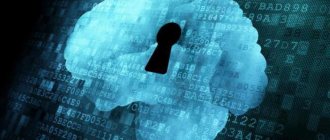Thin threads are reaching out to my hands, As if on stage I would stumble without them... Hey there, up there, you let me go, I can manage without invisible threads...
A. Zhigarev, S. Alikhanov “The Doll’s Song”
Hello, Habr! I am very glad that my strange articles, which I have combined under the title “New Starting Point,” are interesting for someone to read. And I want to say thank you for that. Before this, I reasoned based on some famous films, but sometimes I want to think in free flight.
I noticed that more and more often articles of a psychological and psychopharmacological orientation began to appear, which emanate scientifically proven hopelessness. Either directly or between the lines it is implied that there is no free will, and we are slaves to our instincts, the biochemistry of the brain and the body as a whole. Various pictures are drawn - much like on the KDPV.
I want to share my thoughts in defense of free will. Let me emphasize that this is not a criticism of the scientific paradigm. Quite the contrary - this is an attempt to look at freedom from a scientific point of view. I understand that I’m starting from a disadvantageous, and maybe even obviously losing, position, but I’ll try to make a couple of castlings and somehow build a line of defense. If you like to discuss the undiscussable and prove the unprovable among friends over a mug of a pleasant drink, then I ask under the cat.
The most important question
The issue of free will is a cornerstone issue of philosophy and worldview, on which the lives and destinies of people ultimately depend.
When you start talking about free will, most people look at you like you're an idiot. Half of the people do this because they don’t quite understand what they’re talking about. The other half comes from being understood too well. In order to be clear to the first half and lull the vigilance of the second, we will formulate this question in the most harmless form, which nevertheless retains all the severity of the problem. So:
Can we influence our future?
There is nothing seditious in this question. Any sane person should try to answer it before doing anything in his life. At least for myself. Even if this means making a shaman’s drum from the upholstery of your office chair. And go to the tundra to dance around the fire and drink fly agaric tincture.
All research leads to neurobiology
And this is not surprising. “Not philosophy, not physical determinism—only neuroscience can put an end to the free will debate,” writes neuroscientist W. R. Klemm in his book The Scientific Foundation of Consciousness and Free Will. Klemm argues that some human behavioral characteristics can only be explained by free will, which is the result of processes occurring in the brain [3].
Dr. Eric Racine, in continuation of the theory, proposed the dynamic concept of free will [4]. It stems from recent research in cognitive science and social psychology that has conceptualized free will as a psychological phenomenon with unusual dynamic and intrinsic properties. Dynamic properties reflect changes in response to internal (physiological) and external (physical and social) stimuli. The study suggests that free will is not static, but is influenced by psychological needs and external factors. Thus, dynamic changes in free will will have consequences: oppressed will will lead to disappointment, while a strong will will shape socially responsible behavior and business success.
As R. Baumeister wrote: “The relationship between consciousness and behavior... is empirically provable. However, the influence of the conscious is often indirect and delayed and largely depends on unconscious processes.”
Why prove the obvious?
If we take me, for example, then I don’t need evidence of free will.
I feel it like the five fingers of my hand. Sometimes I look at my hand, move each finger individually, and then make a fist. When my hand obediently carries out my orders, I understand that I am still able to change something in this world. And let them tell me that this is a phantom feeling, like from an amputated limb. I know that I have freedom, just as I know that I have thoughts and emotions. Remember the story of how the wise men gathered and began to prove to each other that motion does not exist (Zeno’s famous paradox). One sage, outraged by these conclusions, stood up and demonstratively walked back and forth, and then left the hall altogether.
I think that this sage, if they began to convince him that he had no freedom, would simply bloody someone’s nose. I remember a joke.
At the trial, a woman is asked: “Why did you hit your husband with a frying pan?” - Why does he tell everyone that I’m so predictable?
But what is obvious to some may not be obvious to others. Moreover, for others, something completely different may be obvious. And even if the same thing is obvious to everyone, it never hurts to talk about it, using various arguments of varying degrees of scientificity and emotionality.
Level of awareness of the consequences of your decisions
According to the Laws of the Universe, our task as parents is to create favorable living conditions for our children. Not only for sons and daughters , but also for the second and third generations ahead, at least. Most of the many will perceive my information in their own way. And this majority will come to the following conclusions about benefits:
- monetary wealth,
- provision of real estate,
- by car.
As a rule, the list is meager and ends with material things. However, if in the process of becoming your child receives all this, then, as a rule, he will be deprived of other lessons. Usually, material accumulation and consumerism give birth to absolutely weak-willed and controllable biorobots . It turns out that the parents and the external environment did not educate them enough.
The lack of free will is passed on to the next generation. The apple never falls far from the tree. It is worth enormous efforts and painful blows from life to change your surrounding world. Not many people manage to achieve positive results. It would be more correct to say that only a few out of a thousand.
It’s not my fault, it just came...
First, I’ll try to understand a little about the humanitarian side of the issue.
I understand that the following reflections will not add or subtract anything in terms of a scientific approach to free will, but I will still speculate about it. If the meaning of free will for the exact sciences can still be somehow disputed, then for the humanitarian branches of knowledge, free will generally constitutes their entire content. This is especially true for the theory of society and law.
Let's assume that scientists would reveal all the true physiological causes of human behavior. What would a trial look like in this case?
Defendant, tell me, why did you steal a wallet with money from a passerby? “It’s not my fault, Your Honor, I was afraid that I would remain hungry.” You know, hunger is a basic human instinct. — Were you hungry at that moment? - No, but I had a fear of future hunger. This was developed as a result of evolution. Here is a study where this is written in detail. - Well, okay, why did you beat him up after that? - Well, you understand, I didn’t like his face. The tribal slot system worked. He seemed like an enemy to me. There is also one completely reliable study about this. - Why did you hit him with a knife? - This is post-motor aggression. The adrenaline level jumped. Cortisol again. Here is a certificate from my endocrinologist. - Why did you hit him with a knife again (a total of nine times)? - Well, it’s quite simple, Your Honor. This is simply a motor reflex, with a positive feedback loop. Pavlov also wrote about this. It's a shame not to know in your position.
If you think this is absurd, then you are mistaken. There are already known cases of acquittals for diabetics who carried out illegal actions when their sugar levels were low. It is with these facts that the famous researcher of the biochemistry of monkeys and humans, Robert Sapolsky, often begins his lectures.
Early research. Libet's experiment
In the late 1970s - early 1980s. B. Libet conducted a series of experiments as part of the study of free will. The volunteers were in a room with a clock and a button next to them. Participants could press the button randomly whenever they wanted - Libet only asked to record the time when such an idea came to mind. All this time, the EEG device recorded the activity of parts of the brain.
Comparing the timing, Libet's team found that about 200 ms elapsed between the conscious desire to press the button and the actual action. But Libet was more surprised by the EEG results: the area of the brain responsible for initiating movement was activated 500 ms before the button was pressed. Consequently, brain activity was recorded 300 ms before the subject realized his desire to press the button. In the world of science, this experiment was regarded as the first demonstration of the illusory nature of free will .
Researchers J.D. Haynes, M. du Sautoy, P. Haggard repeated Libet's experiment. They noted an even longer pause between brain activity and the moment of decision making. According to a 2008 study by the Max Planck Institute in Leipzig, the pause between a decision and its realization was as much as 7 seconds. Repeated experiments confirmed that a decision is made before a person realizes it .
Some scientists, for example, A. Papanicolaou [2], argue that such experiments do not provide logical conclusions and, therefore, cannot be considered objective. According to critics, the actions presented in the studies are nothing more than chaotic movements. Although such movements are the result of the functioning of the nervous system, they cannot be considered an act of free will.
In response to criticisms, other authors introduced the concept of methodological determinism . They noted that it is necessary to question scientific ideas about free will - after all, the statement “free will determines behavior” is unfalsifiable according to K. Popper’s scientific criteria. Thus, it is more appropriate to speak here of a metaphysical statement rather than a scientific hypothesis.
“People are mistaken in thinking that they are free. Therefore the idea of their freedom is that they know no reason for their actions; as for the fact that they say that human actions depend on freedom, these are words with which they do not connect any idea.” — Benedict Spinoza. ("Ethics")
Why is free will denied?
In my opinion, the main reason for the denial of free will is man’s desire to build a predictable world around himself.
And science is the main tool. Science studies cause-and-effect relationships and helps design safe and understandable environments. But the important thing here is that a correctly constructed predictable reality should give a person the right to choose, the right to realize his freedom. Science must come up with a switch that turns the light on and off predictably. But the decision itself - to turn the light on or off - should remain with the person.
To be more specific, I believe that the reason for denying free will is the desire of science to build a comprehensive, predictable picture of the world. This desire is due to the main task of science. But how far can deterministic methodology be applied in studying the world, and especially man?
If you have a hammer in your hands, you see nails everywhere. But maybe it’s not worth driving a nail into a person’s head?
FREE WILL
- the concept of European moral philosophy, which was finally formed by I. Kant in the meaning of an individual’s intelligible ability to moral self-determination. In retrospect, the term “free will” can be considered as a historical and philosophical metaphor: its historically recorded connotations are much broader than the possible normative meaning of the term, which emphasizes the meaning of the concept of “freedom”, and “will” can be replaced by “decision”, “choice” and so on. equivalents. However, over the course of many centuries, the meaningful “core” of the metaphor demonstrates a high degree of invariance of the main problems: what is moral action; Does sanity imply free will? In other words: should moral autonomy exist (as a condition of morality and as the ability to generate extra-natural causation) and what are its limits, i.e. How does natural (divine) determinism relate to the intellectual and moral freedom of the subject?
In the history of philosophy, two main ways of deducing the concept of free will can be distinguished. The first (it was adhered to by Aristotle, Thomas Aquinas and Hegel) comes down to the analytical deduction of the concept of free will from the very concept of will as the ability of the mind to self-determinate and generate special causality. The second method (traced from Plato and the Stoics through Augustine and most of the scholastics up to Kant) is the postulation of free will as independence from external (natural or divine) causality and, therefore, as the ability to self-determination. For the second method, there are two types of justification. First, theodicy
(known since the time of Plato and found its completion in Leibniz), where free will is postulated to prove the innocence of the deity in world evil. Secondly, the Kantian method of proof, opposite in its initial premise (denial of any theodicy), but similar in principle, where free will is postulated by morally legislating reason. These two proofs are similar in the sense that they do not depend on the substantive definition of the will: it is enough to assume a certain quantity that ensures the formal correctness of the “moral equations.” That is why “free will” is equivalent here to “freedom of choice”, “decision”, etc.
“Free will” in ancient and medieval thought (Greek τὸ ἐφ' ἡμῖν, αὐτεξούσιον, αὐτεξουσία, less often προαίρεσνς, αὐτονομί α; Latin arbitrium, liberum arbitrium). Greek moral reflection originated in a universal cosmological paradigm, which made it possible to explain the moral, social and cosmic orders through each other: morality acted as one of the characteristics of an individual’s “involvement” during cosmic events. The law of cosmic retribution, appearing in the guise of fate or fate, expressed the idea of impersonal compensatory justice (clearly formulated, for example, by Anaximander - B 1): what is of fundamental importance is not subjective guilt, but the need to compensate for the damage caused to the order by any “culprit” or “cause” " In archaic and preclassical consciousness the thesis dominates: responsibility does not presuppose free will as an indispensable condition (for example, II. XIX 86; Hes. Theog. 570 sq.; 874; Opp. 36; 49; 225 sq.; Aesch. Pers. 213 –214; 828; Soph. Oed. Col. 282; 528; 546 sq.; 1001 sq.).
Socrates and Plato discovered new approaches to the problem of freedom
and responsibility: imputation is more firmly associated with the arbitrariness of decisions and actions, morality is understood as an epiphenomenon of the highest moral good, and freedom as the ability to do good. Responsibility in Plato has not yet become a fully moral category, but it no longer remains only a problem of violation of the cosmic order: a person is responsible because he has knowledge of moral duty (parallels in Democritus - 33 pp; 601–604; 613–617; 624 Lurie). The virtue of an action is identified with its rationality: no one sins voluntarily (οὐδεὶς ἑκὼν ἁμαρτάνει – Gorg. 468 cd; 509 e; Legg. 860 d sq.). From the need to justify the deity, Ptaton develops the first theodicy: each soul chooses its own lot and is responsible for the choice (“It is the fault of the chooser; God is innocent” - (Rep. X 617 e, cf. Tun. 29 e sd.). However, freedom for Plato, it lies not in the autonomy of the subject, but in the ascetic state (in participation in knowledge and the intelligible highest good).
Plato's theory represents a transitional stage from archaic schemes to Aristotle, with which an important point in understanding free will is associated: the understanding of “volitional” as the self-determination of the mind, which allows us to talk about the “spontaneity” of arbitrariness and analytically derive the concept of the independence of decisions of the mind from the concept of the decision itself; definition of voluntary as “what depends on us” and an indication of the unconditional connection of imputation with the voluntariness of the act. Reason is first understood as a source of specific causality, different from other types - nature, necessity, chance, habit (Nic. Eth. III 5, 1112a31 s.; Rhet. l 10, 1369 a 5–6); arbitrary - as something the cause of which is in the performer of the action (Nic. Eth. III 3, 1111 a 21 s.; III 5, 1112 a 31; Magn. Mor. I 17, 1189 a 5 sq.), or “that what depends on us” (τὸ ἐφ' ἡμῖν) - imputation makes sense only in relation to rationally voluntary actions Nic. Eth. III 1, 1110 b 1 s.; Magn. Mor. I 13, 1188 a 25 s.). The concept of “guilt” receives, therefore, a subjective and personal meaning. Aristotle outlined the future semantic circle of the terms “will”, “choice” (“decision”), “arbitrary”, “goal”, etc. All terms were adopted by the Stoa, and through it passed to Roman authors and into patristics. Aristotle's conclusions are extremely productive, but he often presents them in a social context (the morality of free citizens).
The Stoics cleared the “metaphysical” core of the problem from the social “husk” and came close to the concept of “pure” autonomy of the subject. Their theodicy, or rather cosmodicy, developed the ideas of Plato: if evil cannot be a property of cosmic causality, it stems from man. Imputability requires the independence of the moral decision from external causation (Cic. Ac. pr. II 37; Gell. Noct. Att. VII 2; SVF II 982 sq.). The only thing that “depends on us” is our “consent” (συγκατάθεσις) to accept or reject this or that “representation” (SVF I 61; II 115; 981); The idea of moral obligation was based on this basis. The Stoic scheme of free will was therefore conceived with a double margin of safety. The decision of reason is the source of spontaneous causality and, by definition, cannot but be free (Aristotelian train of thought). Secondly, it must be free in order for its imputation to be possible in principle (conclusions from a theodicy of the Platonic type). However, such autonomy did not fit into the deterministic picture of Stoic cosmology.
The alternative concept of Epicurus, developed somewhat earlier, proceeded from almost the same premises, seeking to free arbitrariness (τὸ ἐφ' ἡμῖν) from external determinism and connect imputation with the arbitrariness of action (Diog. L. X 133–134; fatis avolsa voluntas - Lucr. De rer. nat. II 257). However, having replaced the determinism of fate with the equally global determinism of chance, Epicurus lost the opportunity to explain the final basis of a moral decision, and his concept remained a marginal phenomenon. Thus, the idea of moral autonomy and the unconditional connection between freedom and imputability of action became dominant no earlier than the 3rd century. BC. and found its paradigmatic expression in Plotinus (Enn. VI 8.5–6). At the same time, internal responsibility in the ancient understanding is distinguished by a strong legal connotation: for the ancient consciousness, the difference between morality and law did not have the fundamental character that it acquired in the era of Christianity, and especially in modern times. The universal imperative of antiquity can be formulated as follows: the goal is one’s own perfection and the right of one’s neighbor. Normative terms conveying the concept of free will in the texts of non-Christian authors were Greek. τὸ ἐφ' ἡμῖν, less often προαίρεσις (mainly in Epictetus), even less often αὐτονομία and αὐτεξουσία (including derivatives, for example, Epict. 'Diss. IV 1.56; 62; Procl. In Rp. II p. 266.22; 324 ,3 Kroll; In Tim. III p. 280,15 Diehl), lat. arbitrium, potestas, in nobis (Cicero, Seneca).
Christianity 1) radically transformed the moral imperative, declaring the goal of the good of one’s neighbor and thereby separating the sphere of ethics from the sphere of law; 2) modified the theodicy, replacing impersonal cosmic determinism with unique divine causality. However, the problematic side of the issue has not undergone significant changes. The established semantic field and tested trains of thought are invariably present in eastern patristics from Clement of Alexandria (Strom. V 14,136,4) and Origen (De pr. I 8,3; III 1,1 sq.) to Nemesius (39–40) and John Damascene (Exp. fid. 21; 39–40); along with the traditional τὸ ἐφ' ἡμῖν, the term αὐτεξούσιον (αὐτεξούσια) begins to be widely used. The formula of Nemesius, going back to Aristotle, “reason is something free and autocratic” (ἐλεύθερον… καὶ αὐτεξούσιον τὸ λογικόν De nat. hom. 2, p.36,26 sq. Morani) is typical for a large period of Christian reflection (cf. Orig. In Ev. Ioan, fr.43).
At the same time, the problem of free will increasingly became the property of Latin Christianity (starting with Tertullian - Adv. Herrn. 10–14; De ex. cast. 2), finding its culmination in Augustine
(he uses the technical term liberum arbitrium, which is also normative for scholasticism).
In his early works – the treatise “On the Free Decision” (“De libero arbitrio”) and others – a classical theodicy was developed, based on the idea of a rationalistically understood world order: God is not responsible for evil; the only source of evil is the will. For morality to be possible, the subject must be free from external (including supernatural) causality and able to choose between good and evil. Morality consists in following moral duty: the very idea of a moral law acts as a sufficient motive (although the content of the law is of a divinely revealed nature). In the later period, this scheme is replaced by the concept of predestination, which reaches its completion in anti-Pelagian treatises (“On Grace and Free Decision”, “On the Predestination of the Saints”, etc.) and leads Augustine to a final break with ethical rationalism. The antagonists of the late Augustine, Pelagius
and his followers, defended the same classical theory of free will and imputation (in the form of “synergy,” i.e., the interaction of human and divine will) that Augustine developed in his early writings.
The medieval problem of free will in its main features goes back to the tradition of Augustine’s “De libero arbitrio”; The mediators between Augustine and scholasticism are Boethius (Cons. V 2–3) and Eriugena (De praed. div. 5;8;10). Early scholasticism - Anselm of Canterbury, Abelard, Peter of Lombardy, Bernard of Clairvaux, Hugo and Richard of Saint-Victor - steadily reproduced the classical scheme, focusing on the Augustinian version, but not without some nuances. In particular, Anselm of Canterbury understands liberum arbitrium not as a neutral capacity of arbitrariness (later its liberum arbitrium indifferentiae), but as freedom to good (De lib. arb. 1;3). High scholasticism presented the classical tradition with a noticeable peripatetic accent: in the 13th century. the basis of the argument becomes the Aristotelian doctrine of the self-movement of the soul and the self-determination of the mind, while the Augustinian theodicy with the postulation of free will recedes into the background. This position is typical of Albertus Magnus and especially of Thomas Aquinas, who uses direct borrowings from Aristotle, in particular Sth. I q.84.4= Eth. Nic. III 5.1113 a 11–12). Liberum arbitrium is a purely intellectual ability, close to the ability of judgment (I q.83,2–3). The will is free from external necessity, since its decision is itself a necessity (I q. 82.1 cf. Aug. Civ. D. V 10). A key aspect of the problem of free will is imputation: an act is imputed on the basis that a rational being is capable of self-determination (I q.83,1).
Literature:
1. Verweyen J.
Das Problem der Willensfreiheit in der Scholastic. Hdlb., 1909;
2. Saarinen R.
Weakness of the nill in mediaeval thought. From Angusfme to Buridan. Helsinki, 1993;
3. Pohlenz M.
Griechische Freiheit. Wesen und Werden eines Lebensideals. Hdlb., 1955;
4. Clark MT
Augustutine. Philosopher of Freedom. A Study in comparative philosophy. NY–P., 1958;
5. Adkins A.
Merit and Responsibility. A Study in Greek Values. Oxf., 1960;
6. Die goldene Regel. Eine Einführung in die Geschichte der antiken und früchristüchen Vulgärethik. Gott., 1962;
7. Hall J.
Historische und systematische Untersuchungen zum Bedingungsverhältnis von Freiheit und Verantwortlichkeit. Königstein, 1980;
8. Pohlenz M.
Griechische Freiheit. Wfesen und Werden eins Lebensideals, 1955;
9. Clark MT
Augustine. Philosopher of Freedom. A study in comparative philosophy. NY–P., 1958.
A.A. Stolyarov
The Renaissance, with its characteristic anthropocentrism, and the Reformation gave particular urgency to the problem of free will. Pico della Mirandola saw the dignity and originality of man in free will as a gift of God, thanks to which creative participation in the transformation of the world is possible. God does not predetermine either man's place in the world or his responsibilities. By his own will, a person can rise to the level of the stars or angels or descend to a bestial state, for he is the product of his own choice and efforts. The original sinfulness of human nature recedes into the shadows.
The rise of human free will forced us to return to the problem of its reconciliation with the omnipotence and omniscience of God. Erasmus of Rotterdam
(De libero arbitrio, 1524) insisted on the possibility of “synergy” - the combination of Divine grace and human free will, subject to a willingness to cooperate.
Luther
(De servo arbitrio, 1525) declared free will to “pure deception” to be an “illusion of human pride”: the will of man is not free for either good or evil, it is in absolute slavery either to God or to the devil;
the outcome of all actions is predetermined by God's will. In the human soul spoiled by the Fall, pure thoughts cannot arise without Divine grace. J. Calvin
took an even tougher position on the issue of predestination in his “Instructions of the Christian Faith” (1536): even faith in Christ itself is an action of Divine grace, people are eternally predestined to salvation or damnation, and no act can either gain or lose grace her.
Thus, the founders of Protestantism took the providentialist point of view of the late Augustine to its logical extreme. The consistent implementation of such “supranaturalistic determinism” led to contradiction, if not absurdity. Luther and Calvin excluded the possibility of free self-determination, but thereby denied man's ability to be an agent, a subject, and not an object of action, and called into question human godlikeness. Trying to preserve at least the appearance of human activity (without which there can be no talk of guilt and sin), Luther was forced to allow the free will of people in relation to what is below them, for example. to property, and claim that they still sin of their own free will. Calvin deprives a person of the ability to contribute to salvation, but allows the ability to make himself worthy of salvation. But here any connection between action and result is severed. Already Philip Melanchthon (“Augsburg Confession”, 1531, 1540) abandoned Luther’s extremes, and Arminius directed the Remonstrant movement against Calvinist predestination.
Post-Tridentine Catholicism took a more cautious position on the issue of julial freedom: the Council of Trent (1545–63) condemned the Protestant “slavery of the will,” returning to the Pelagian-Erasmian idea of cooperation between man and God, the connection between action and retribution. The Jesuits I. Loyola, L. de Molina, P. da Fonseca, F. Suarez and others declared grace to be the property of every person, and salvation is the result of its active acceptance. “Let us expect success only from grace, but let us work as if it depends only on us” (I. Loyola). Their opponents, the Jansenists (C. Jansenius, A. Arno, B. Pascal, etc.) leaned toward the moderate Augustinian version of predestination, arguing that free will was lost after the Fall. The Jesuit apology for free will and “small deeds” often turned into arbitrariness in the interpretation of moral norms (the doctrine of “probabilism”
), and Jansenist moral rigorism bordered on fanaticism.
Theological disputes about free will determined the demarcation of positions in European philosophy of the New Age. According to Descartes, in man the spiritual substance is independent of the physical, and free will is one of its manifestations. Human free will is absolute, since the will can make a decision in any situation and even contrary to reason: “The will is by nature free to such an extent that it can never be forced.” This neutral ability of voluntary choice (Liberum arbitrium indifferentiae) is the lowest level of free will. Its level increases as the reasonable basis for choice expands. Illness and sleep fetter free will, a clear mind contributes to its highest manifestation. Due to Cartesian dualism, it turned out to be impossible to explain how the will invades the chain of changes in bodily substance.
Trying to overcome this dualism, representatives of occasionalism
A. Geulinx and N. Malebranche emphasized the unity of human and Divine will.
On Protestant soil, supranaturalistic determinism was transformed into naturalistic (T. Hobbes, B. Spinoza, J. Priestley, D. Hartley, etc.). In Hobbes, Divine Providence is pushed back to the beginning of a continuous chain of natural causes; all events in the world and human actions are causally determined and necessary. Human freedom is defined by the absence of external obstacles to action: a person is free if he does not act out of fear of violence and can do what he wants. The desire itself is not free, it is caused by external objects, innate properties and habits. Choice is only a struggle of motives, “alternating fear and hope”; its outcome is determined by the strongest motive. The illusion of free will arises due to the fact that a person does not know the force that determined his action. A similar position is reproduced by Spinoza: “People are aware of their desire, but do not know the reasons by which they are determined” and by Leibniz: “... In man, everything is known and determined in advance... and the human soul is in some way a spiritual automaton.”
Moral concepts and motives are placed on a par with natural causes.
The relationship between free will and causal determination is one of the central problems of Kant's philosophy. As an empirical subject, man is subject to immutable natural laws, and with knowledge of all previous conditions his actions can be predicted with the same accuracy as solar and lunar eclipses. But as a “thing in itself”
, not subject to the conditions of space, time and causality, a person has free will - the ability to self-determination regardless of sensory impulses. Kant calls this ability practical reason. Unlike Descartes, he does not consider the idea of free will to be innate: he derives it from the concept of ought (sollen). The highest form of free will (“positive freedom”) consists of moral autonomy, the self-legislation of reason.
Fichte sharply shifted the emphasis from being to activity, declaring the entire world (“not-I”) a product of the free creativity of the I and completely subordinating theoretical reason to practical reason, knowledge (Wissen) to conscience (Gewissen). Cause-and-effect relationships become alienation of target relationships, and the world of natural dependencies becomes an illusory form of perception of the products of the unconscious activity of the human imagination. Finding freedom is the return of the Self to itself, its awareness of the fact that it has unconsciously made an ascent from sensory attraction to conscious goal-setting, limited only by the presence of other reasonable selves; Through law, freedom is realized in society. The movement towards free will is the content of Hegel’s psychology of spirit, and history appears in Hegel as the formation of objective forms of freedom: abstract law, morality, morality. In the culture of the Western world, which was born along with Christianity, the acquisition of freedom is understood as a person’s destiny. Arbitrariness is only a step in the development of freedom, its negative rational form (abstraction from everything random), revealing free will as the ability to self-determination. The highest manifestation of free will is a moral act; its act coincides with the decision of reason.
Schelling, having adopted the ideas of J. Boehme and F. Baader, emphasized the moment of antinomy in the concept of free will. Human free will is not rooted in reason and its autonomy, but has metaphysical depth; it can lead to both good and sin, vice: in the desire for self-affirmation, a person is able to consciously choose evil. This irrationalistic understanding of free will excluded its interpretation as the dominance of reason over sensuality.
Marxism, following the Hegelian tradition, sees the main content of free will in the degree of practical awareness. According to the formula of F. Engels, free will is “the ability to make a decision with knowledge of the matter.” A. Schopenhauer returns to Spinoza’s interpretation of free will as an illusion of the human mind: the attribute of freedom is applied not to phenomenal action, but to noumenal being (will as a thing in itself) and practically comes down to fidelity to one’s intelligible character.
In the 20th century in the “new ontology” of N. Hartmann, the concepts of freedom and activity, freedom and independence are separated. The lower layers of being - inorganic and organic - are more active, but have less freedom, the higher layers - mental and spiritual - are more free, but do not have their own activity. The relationship between negative freedom (arbitrariness) and positive freedom (reasonable value determination) is rethought: a person has free will not only in relation to lower physical and mental determination, but also in relation to God, in other words, to the objective hierarchy of values, the world of which does not have an immutable determining force. Ideal values guide a person, but do not predetermine his actions. To the Kantian antinomy of freedom and natural causality, Hartmann adds the antinomy of the ought: the ought determines the behavior of the individual ideally, i.e. range of possibilities, but for the choice to take place, real will is necessary, which is associated with the autonomy of the person, and not the autonomy of the principle.
The ontological justification for free will was contained in the works of such representatives of phenomenology
,
like M. Scheler, G. Rainer, R. Ingarden). A kind of “idolatry of freedom” (S.A. Levitsky) was presented by existentialism
, which brought the antinomy of human existence to deep tragedy - the “healthy tragedy of life” in K. Jaspers or the “tragic absurdity” in J.-P. Sartre and A. Camus. Religious existentialism interprets free will as following the instructions of the transcendent (God), expressed in the form of symbols and codes of existence, which are voiced by conscience. In atheistic existentialism, free will is the ability to preserve oneself, rooted in nothing and expressed in denial: values do not have objective existence, man himself constructs them in order to realize his freedom. Necessity is an illusion that justifies “flight from freedom,” as the neo-Freudian E. Fromm put it. Absolute freedom makes the burden of responsibility so heavy that the “heroism of Sisyphus” is necessary to bear it.
Russian religious philosophy of the 20th century. (N.A. Berdyaev, S.N. Bulgakov, N.O. Lossky, B.P. Vysheslavtsev, G.P. Fedotov, S.A. Levitsky, etc.) proceeds from the combination of Divine grace with the free self-determination of man. The most radical position is Berdyaev, who believes, following J. Boehme, that freedom, rooted in the “abyss” coeternal with God, precedes not only nature, but also being in general; the free creative act becomes a supreme and self-sufficient value for Berdyaev. In the concrete ideal-realism of N.O. Lossky, free will is declared an essential attribute of “substantial figures” who independently create their character and their destiny (including from their body, character, past and even from God himself), independent of the external world, since all events are only reasons for their behavior, not reasons.
Literature:
1. Windelband V.
About free will.
– In the book: He is the same.
Spirit and history. M., 1995;
2. Vysheslavtsev B.P.
Ethics of transformed Eros. M., 1994;
3. Levitsky S.A.
The tragedy of freedom. M., 1995;
4. Lossky N.O.
Free will.
– In the book: He is the same.
Favorites. M., 1991;
5. Luther M.
About the slavery of the will;
6. Erasmus of Rotterdam. Diatribe, or Discourse on Free Will. – In the book: Erasmus of Rotterdam. Philosopher. prod. M., 1986;
7. Hartmann N.
Ethik. V., 1926.
8. See also lit. to Art. Freedom
.
A.P. Skripnik
Free will is the foundation of science
I will try to show that the concept of free will is fundamentally present in science.
As an example, I will take mathematics, which, as is known, is the queen of sciences. One of the basic concepts of mathematics is function. As you know, a function has independent, or free, variables. The name itself suggests the right thoughts. This means that some free will can arbitrarily assign values to these variables, and mathematics must obediently specify the value of the function.
It is also interesting to define a limit - the basis of mathematical analysis. There are even supposed to be several beings with free will. One creature chooses the “predetermined value”, and the other creature chooses the “value of the argument at which”.
The principle of my reasoning, I think, is clear. We choose terms that have the words independent, free in their definitions, and try to understand what this term means in the light of the presence of free will. For example, “degree of freedom” in mathematics and mechanics. You can find many other examples.
As you know, in order to have correct judgments, you need to call things by their proper names. Mathematics and physics are precisely those sciences where everything is called by its proper name. And if there are concepts of independent variables and degrees of freedom, then that is what they are.
The old postulate trick has never failed
Of course, the most basic question is where freedom can come from and what physical laws determine its existence.
When science cannot explain some facts, it takes them as axioms. If you think that this is some kind of cheating trick, then you are mistaken. This is common scientific practice. For example, Einstein managed to pull off this trick even twice: in the special theory of relativity, he accepted as a postulate the completely inexplicable constancy of the speed of light. In the general theory of relativity - the equality of gravitational and inertial masses, which was also an inexplicable, but precisely established scientific fact.
Likewise, we must postulate that the mass and energy in our universe can exhibit freedom. And some of her behavior cannot be explained by cause-and-effect relationships. Science should not ignore free will. It must include it in its conceptual and methodological apparatus.
In the light of this idea, the correct question (I already mentioned this in another article) is not how freedom arises as a result of physical laws, but how physical laws limit the absolute freedom that is initially inherent in us.
Second dialectical barrier
When they talk about dialectics, they usually cite the following related concepts: hot-cold, heavy-light, good-evil.
But in my opinion, these are weak dialectical pairs. There are stronger dialectical concepts. They cannot be mixed as easily as water in a gang. And the transition between them is not so easy. And I would call them dialectical barriers. As examples: form and content, strategy and tactics, matter and consciousness, information and energy, and, of course, predictability and freedom.
Let’s take a closer look at the pair – information and energy. It is quite obvious that one cannot exist without the other. Any information has an energy carrier. Any energy carries some information. Despite the complexity and elusiveness of this relationship, humanity has overcome this barrier. And now we can design devices that combine energy and information in any proportions we need.
The concepts of determinism and freedom belong to the same dialectical barrier. Someday we will overcome this too. And we will design devices that combine predictability and freedom in the form and in those relationships that will be useful to us. And then artificial intelligence will become really strong.
Neurobiological explanation
G. Frankfurt and D. Dennett suggest that free will and determinism can be compatible (the so-called concept of compatibilism ). Frankfurt argues that during an intrapersonal conflict, a person experiences equal desires - to perform / not to perform an action [6]. From a neurobiological point of view, at this moment there is a conflict between the pleasure center and inhibitory control. Dennett developed the idea of the evolutionary development of free will and decision making (for example, through altruism, the desire to help others).
H. Fuster proposed a cyclical model of decision making [7], according to which action and the decision to act can begin and end at any stage of the perception-action cycle. Here, free will is born as a result of the relationship between the brain and the surrounding world (more precisely, ideas about this world stored in the cerebral cortex). Fuster believed that such a complex system as the brain develops due to its plasticity and adaptability. In the course of adaptation to new conditions, new functions appear - and, accordingly, freedom of knowledge.
However, we should not assume that free will resides only in the prefrontal cortex of the brain. Fuster called it only a “neuromediator” in the more complex relationship between the inner and outer world.
Another point of view on free will is multi-determinism . According to this theory, the more motives there are, the fewer restrictions there are on free will. At the other pole here is reductionism, which searches for only one, the most important motive for action. However, as neuropsychologist R. Sperry said: “Trying to crack the biomolecular code of cognitive processes is like deciphering a note by studying the chemical composition of ink.”
So, free will from a neurobiological point of view is the freedom to exchange information in the cerebral cortex. From the point of view of cognitive science, it is the result of the functioning of the nervous system, taking into account the influence of the conscious and unconscious components on decisions. At the same time, the concept of free will is still not defined - especially in the context of a changing scientific paradigm and a multidisciplinary approach. Psychology can predict a person's choices; Cognitive neuroscience suggests neural patterns for learning to make decisions. Hebb's rule represents an "associative" view of learning and free will. After creating a neural network for the decision-making system, it became clear that a developed network would be able to predict choices that we considered arbitrary.
How will the problem of free will be solved when more and more disciplines study it comprehensively? So far this question remains unanswered.
Light of freedom
There is a story about the inventor of a perpetual motion machine.
When he was told that eternal motion was impossible, he replied: “My eyes tell me the opposite - everything in the universe is involved in eternal causeless motion.” I get the same feeling when I try to think about free will. Everything in the universe is imbued with the spirit of freedom. This feeling arises, for example, when I try to make sense of the strange world of quantum physics and elementary particles.
For example, a particle of light is a photon. In his behavior he shows incredible ingenuity and freedom. It moves towards the goal simultaneously along all possible trajectories. He interacts with whoever he wants, when he wants. He strongly resists any attempts at observation. He is constantly in a superposition with respect to any characteristics. He postpones all his quantum decisions for as long as possible.
We act almost exactly like a photon. When solving a problem, we consider all options. We put off all our decisions until the very last moment. We don't like it when someone sticks their nose and measuring instruments into our affairs. We do not want and cannot make up our minds, and we are in a superposition regarding almost all important issues.
We are made of light. And just as free. We just have a little more restrictions.
Experiments
In 2007, Berlin neurologist J.D. Haynes found using MRI that he could determine with a 60% probability which of two buttons a subject would press. The scientist determined this 6 seconds before realizing the desire to press the button and 7 seconds before the actual action.
Neurologist Itzhak Fried also conducted an experiment [5], but with the participation of patients with epilepsy. The scientist found that 1.5 seconds before making a decision, individual neurons in a certain area of the brain are activated in the subjects. According to Fried, some predetermined ideas are simply accepted by our consciousness. Thus, the conscious can be considered as one of the later stages of choice.











